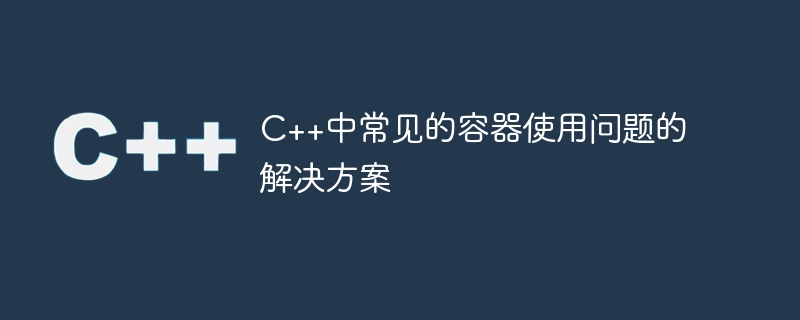Home >Backend Development >C++ >Solutions to common container usage problems in C++
Solutions to common container usage problems in C++
- WBOYWBOYWBOYWBOYWBOYWBOYWBOYWBOYWBOYWBOYWBOYWBOYWBOriginal
- 2023-10-10 09:49:531915browse

Solutions to common container usage problems in C
Introduction:
C, as a widely used programming language, provides a rich set of container classes. Such as vector, list, map, etc., used to store and operate data. However, the use of containers is often accompanied by some problems, such as iterator failure, memory leaks, etc. This article provides solutions to these common container usage problems and provides specific code examples.
1. The problem of iterator failure
- Description:
When using the iterator of the container to perform a traversal operation, if an insertion or deletion operation is performed during the traversal process , it may cause the iterator to fail. - Solution:
a. After the insertion operation, use the returned new iterator to traverse.
b. After the deletion operation, do not continue to use the previously expired iterator.
Sample code:
vector<int> nums = {1, 2, 3, 4, 5};
vector<int>::iterator it = nums.begin();
while (it != nums.end()) {
if (*it % 2 == 0) {
it = nums.insert(it, 0); // 在偶数之前插入0
++it; // 将迭代器移到下一个元素位置
}
++it;
}
for (int num : nums) {
cout << num << " ";
}2. Memory leak problem
- Description:
When using a container to store dynamically allocated memory, if If these memories are not released in time, memory leaks will occur. - Solution:
a. Before destroying the container, traverse the container and release each dynamically allocated memory.
b. When using containers, you can consider using smart pointers to manage dynamically allocated memory and automatically release memory.
Sample code:
vector<int*> ptrs;
for (int i = 0; i < 10; ++i) {
int* ptr = new int(i);
ptrs.push_back(ptr);
}
// 释放动态分配的内存
for (int* ptr : ptrs) {
delete ptr;
}
ptrs.clear(); // 清空容器3. Container application scenario selection problem
- Description:
In different application scenarios, different containers There may be different performance, and you need to choose the appropriate container according to your needs. - Solution:
a. If you need random access and fast insertion/deletion operations, you can use vector.
b. If you need to insert/delete elements frequently, you can use list.
c. If you need to access elements by key, you can use map.
Sample code:
vector<int> vec = {1, 2, 3, 4, 5};
vec.push_back(6); // 在数组末尾插入6
vec.pop_back(); // 删除数组末尾的元素
list<int> lst = {1, 2, 3, 4, 5};
lst.push_front(0); // 在链表头部插入0
lst.pop_front(); // 删除链表头部的元素
map<string, int> scores;
scores["Alice"] = 90; // 插入键值对
scores["Bob"] = 80;
scores.erase("Alice"); // 删除键值对Conclusion:
When using C containers, we need to pay attention to the problems of iterator invalidation and memory leaks, and choose the appropriate container according to actual needs . Through reasonable use and understanding of the nature of containers, the efficiency and maintainability of the program can be better optimized.
This article provides solutions to the problems of iterator failure and memory leaks, and gives specific code examples, hoping to help readers better understand and use C containers.
The above is the detailed content of Solutions to common container usage problems in C++. For more information, please follow other related articles on the PHP Chinese website!

